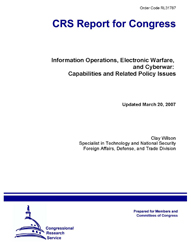 Capabilities and Related Policy Issues
Capabilities and Related Policy Issues
- Congressional Research Service
- Clay Wilson, Specialist in Technology and National Security
Foreign Affairs, Defense, and Trade Division - 17 pages
- Public
- March 20, 2007
This report describes the emerging areas of information operations, electronic warfare, and cyberwar in the context of U.S. national security. It also suggests related policy issues of potential interest to Congress. For military planners, the control of information is critical to military success, and communications networks and computers are of vital operational importance. The use of technology to both control and disrupt the flow of information has been generally referred to by several names: information warfare, electronic warfare, cyberwar, netwar, and Information Operations (IO). Currently, IO activities are grouped by the Department of Defense (DOD) into five core capabilities: (1) Psychological Operations, (2) Military Deception, (3) Operational Security, (4) Computer Network Operations, and (5) Electronic Warfare. Current U.S. military doctrine for IO now places increased emphasis on Psychological Operations, Computer Network Operations, and Electronic Warfare, which includes use of non-kinetic electromagnetic pulse (EMP) weapons, and nonlethal weapons for crowd control. However, as high technology is increasingly incorporated into military functions, the boundaries between all five IO core capabilities are becoming blurred.
DOD has noted that military functions involving the electromagnetic spectrum take place in what is now called the cyber domain, similar to air, land, and sea. This cyber domain is the responsibility of the new Air Force Cyber Command and includes cyberwarfare, electronic warfare, and protection of U.S. critical infrastructure networks that support telecommunications systems, utilities, and transportation.
…
Control of information has always been part of military operations, and the U.S. Strategic Command views information operations as a core military competency, with new emphasis on (1) use of electromagnetic energy, (2) cyber operations, and (3) use of psychological operations to manipulate an adversary’s perceptions. Department of Defense (DOD) officials now consider cyberspace to be a domain forwarfare, similar to air, space, land, and sea.
The DOD views information itself as both a weapon and a target in warfare. In addition, Psychological Operations (PSYOP) provides the ability to rapidly disseminate persuasive information to directly influence the decisionmaking of diverse audiences, and is seen as a means for deterring aggression, and important for undermining the leadership and popular support for terrorist organizations. However, new technologies for military IO also create new national security policy issues, including (1) consideration of psychological operations used to affect friendly nations or domestic audiences; and (2) possible accusations against the U.S. of war crimes if offensive military computer operations or electronic warfare tools severely disrupt critical civilian computer systems, or the systems of non-combatant nations.
…
At the same time, the civilian Al Jazeera news network, based in Qatar, beams its messages to well over 35 million viewers in the Middle East, and is considered by many to be a “market competitor” for U.S. PSYOP. Terrorist groups can also use the Internet to quickly place their own messages before an international audience. Some observers have stated that the U.S. will continue to lose ground in the global media wars until it develops a coordinated strategic communications strategy to counter competitive civilian news media, such as Al Jazeera.
…
Domination of the Electromagnetic Spectrum.
DOD now emphasizes maximum control of the entire electromagnetic spectrum, including the capability to disrupt all current and future communication systems, sensors, and weapons systems. This may include: (1) navigation warfare, including methods for offensive space operations where global positioning satellites may be disrupted; or, (2) methods to control adversary radio systems; and, (3) methods to place false images onto radar systems, block directed energy weapons, and misdirect unmanned aerial vehicles (UAVs) or robots operated by adversaries.
…
Homeland security reportedly will also be a large part of the Cyber Command’s responsibility, including protection of telecommunications systems, utilities, and transportation. Several issues to be considered may include: (1) what kind of educational skills, technical skills, and training are needed for staff at the Cyber Command; and (2), what kind of career path can be offered to those in the Air Force who want to participate in defending the new cyber domain.
